Revell 1/32 Bell X1 Plastic Model Conversion
Revell - 1/32 Bell X1
Contributed by Drake "Doc" Damerau
| Manufacturer: | Revell |
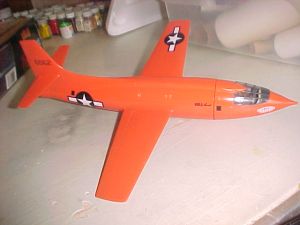 Brief:
Brief:
This my first attempt at PMC and the first plastic model I've built in 25 years. As such, I chose one that looked like it would be both an easy model and an easy conversion.
Construction:
Here is what I used:
- Revell 1:32 Bell X1 Model Kit #KIT4565
- BT-20 to BT-50 rings
- BT-50 to BT-60 CR
- 4" of BT-20 MMT
- 6.5" of BT-50 for chute compartment
- BT-50 coupler
- Launch lug
Main Body Assembly
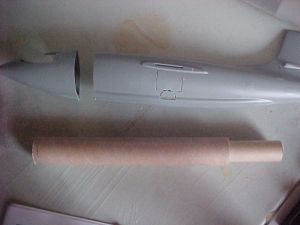 Assemble the motor tube and body tube as shown.
Assemble the motor tube and body tube as shown.
Remove all of the protrusions on the inside of the two halves of the model so that the body tube/engine mount assembly will fit. You'll need to remove the landing gear wells to make room for the center tube. Mark the fuselage halves about an 1/8" to ¼" behind the point where the cockpit gets glued in. Read the models assembly instructions to see where this is. This is critical in a later step.
There is no gear up or gear down choice on this build because of the need to remove the wheel wells to get the tubes inside. Glue the doors on the sides of the plane. They don't fit well so you'll have to work on them to get them to look good.
Glue the two halves of the main body together along the entire length of the fuselage. Let dry overnight. You will need a strong bond for the subsequent steps.
Cut and sand the aft end so the motor tube will fit. This will be about an inch. The pictures show how it should look after this is complete. Note how the cut is just below the rudder. You will need to fill this area with spot putty later to get a smooth transition.
Using a razor saw, cut the model in half just behind the cockpit at the mark you made earlier. A good straight cut here will make the model look much better.
Install the body tube assembly into the rocket. Use the CR to center the forward end of the tube and glue in place.
Cockpit assembly
Don't install the pedals. You will need the room for nose weight. Glue in the instrument panel.
I used clay and BBs for nose weight. I added 15 grams to the nose before I glued in Chuck. (You and Chuck should be on a first name basis by now.) You should end up with enough clay so Chuck's feet get pushed into it. Glue in the Chuckster.
Paint the first row of panels in the cockpit glass black on the underside. This will hide the clay.
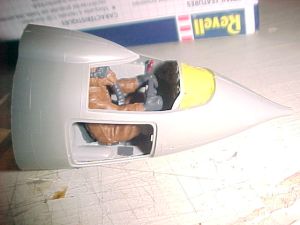
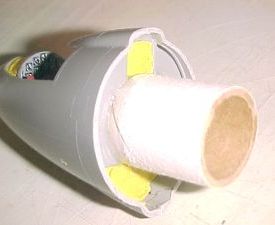
I used a U.S. Rockets 18mm to 24mm motor adapter for the coupler. This was because it was thick and longer than a normal coupler. (I figured it needed a lot of "meat" for gluing.) I pealed the glassine layer off the glue area for better glue adhesion. To install and align, insert it into the body tube in the aft airframe and apply model cement to the exposed end. Use the "nose cone" to push it further into the BT being careful to align everything. When the nose cone was aligned with the rest of the model, I taped it in place until it was dry. This aligns the coupler with the BT and glues it to the cockpit area. Be careful not to get glue on anything but where it needs to go. After the cement is dry, remove the "nose cone" from the rocket and apply cement fillets to the coupler/cockpit joint.
Pack in a bunch more nose weight. I put a bunch behind the cockpit and inside the coupler. Don't forget to glue a shock cord in the coupler before you add the weight. My finished nose cone weighed 79.5 grams.
Final assembly
Glue all the wings on.
Glue the launch lug on the belly, aligned with the wheel wells. The CG should be at the front of the wing with everything installed for launch.
Use spot putty to fill in the engine/tail area. Again, look at my finished tail section to see how it should look.
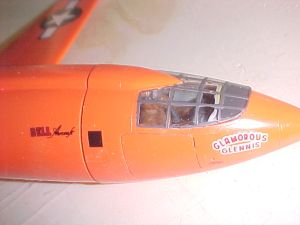
Finishing:
I painted the cockpit components (before installation). The body was easy, as all it needed was a coat of Testers orange. The decals went on without incident.
Flight and Recovery:
To get an idea how high it would go and to choose a delay, I simmed it in RockSim. The sim I came up with was pretty close to the actual model. I had to do a mass override to get it right. The predicted altitude was 250' with a C6-3. Wishful thinking I guess. I then simmed it using a D21-7 and it showed it going to 1050'.
The flight was a bit squirrelly but remarkably, she held together. The ejection charge was late and so energetic that it broke the shock cord. There was no real damage and it will fly again.
 |
 |